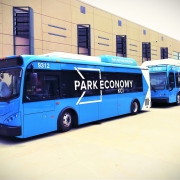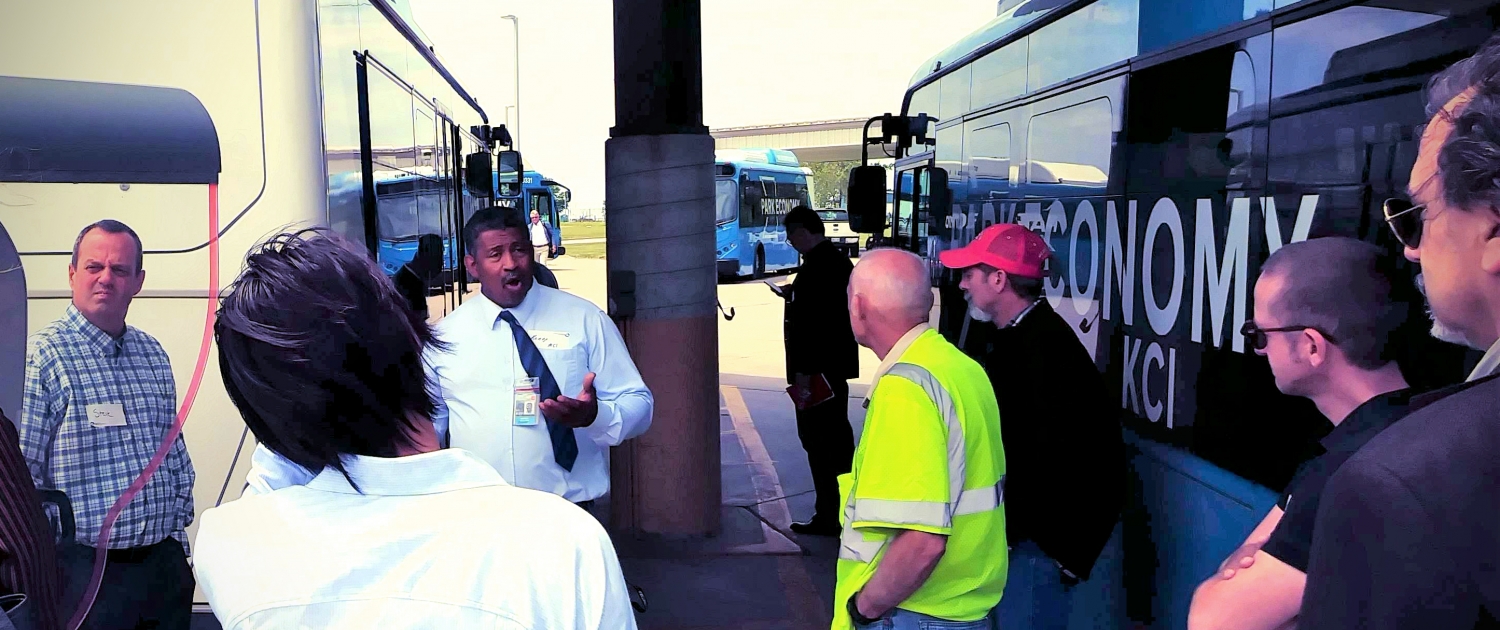written by Kansas City Regional Clean Cities Coalition director David Albrecht
Kansas City International Airport is no stranger to cleaner fuels. It began deploying compressed natural gas (CNG) buses back in 1997, providing natural gas on site with its own high-speed fueling station. This made the Aviation Department something of a pioneer in alt-fuel adoption. The next step, though, was a big jump in fuel efficiency, and in October of 2017, KCI became the first US airport to deploy all-electric shuttle buses. It’s currently running 7 BYD K7 battery-electric shuttles along with older CNG units.
There’s no getting around the fact that up-front costs for electric vehicles are going to be higher than for equivalent conventional buses. In fact, when the airport rolled out data on the comparative costs of different fuels, the contrast was stark. A brand-new diesel shuttle buses cost about $385,000; for CNG, add an additional 14% for a sticker price of $440,000. All-electric models come in at a fairly eye-popping $540,000, more than 40% more expensive than the price for a baseline diesel.
But as anybody who’s bought a car knows, the sticker price isn’t the only price. The sticker price, in fact, is only the beginning of years of recurring costs. Kenny Williams is the Fleet Asset Manager for the Aviation Department and one of the main proponents of the EV deployment back in 2016-17 as the project began to take shape. He broke it down as follows:
Costs Per Mile (Including fuel and maintenance)
- Diesel – variable/volatile fuel prices; approximate costs $1.50/mile
- CNG – more stable fuel prices; approximate costs $1.00/mile, $0.45-.50 w. alt-fuel tax credit
- Electric – fixed fuel prices; approximate costs $0.50/mile
Maintenance costs add up quickly for the shuttle bus duty cycle. Oil changes for CNG units are about $170 and have to happen every other month. Annual tune-ups add an additional $3,800 to CNG bus operating costs. So, even with fuel at an economical $0.50/gallon thanks to the clean fuel tax credit, CNG bus maintenance per year comes in between $4,800 and $5,000 per unit. It’s not like EV buses float on air. Like CNG units, they need new tires, and fluid changes every 18 months add annual costs of about $165 per year. But no internal combustion engine means no tune-ups, avoiding the lion’s share of regular maintenance overhead.
And yet, even with maintenance savings of around $50,000 per bus over ten years, there’s still a big price gap between diesel, CNG and electric buses. That’s where federal clean-fuel funding comes in. Thanks to support from the US Department of Energy, KCI was eligible for reimbursements of $72,000 per bus, dropping their costs to just $2,000 more than comparable CNG shuttles.
The same grant, “Accelerating Alternative Fuel Adoption in Mid-America” provided funding for charging infrastructure, covering about $100,000 of $225,000 in construction and equipment costs for the new systems. KCI’s electric bus charging lot has eight pedestals installed, with space for an additional four slots if more EV units are purchased. Charging time is about three hours, and this “fueling” process hasn’t had any negative impact on operations.
What has the driver response been like? Per Kenny Williams, “For most drivers, once they drive them, they really like them.” The only minor hitch has been how drivers operate the bus HVAC systems – since they are battery-driven, power loss from cranking up AC or heating at full throttle can take a bite out of driving range when a gentler touch would work better. And KCI is planning on investing in additional EV units. The economic toll of the pandemic has postponed acquisition of a few of the 12 units originally planned. However, the Aviation Department is planning on ordering three more units in addition to the seven already in service. These new buses will be slightly different. They’ll have inductive charging systems, which will let them power up without cords or plugs, as they pick up passengers at the new terminal starting in early 2023.
This material is based upon work supported by the U.S. Department of Energy’s Office of Energy Efficiency and Renewable Energy (EERE) Vehicle Technologies Program under Award Number DE-EE0008262 .


